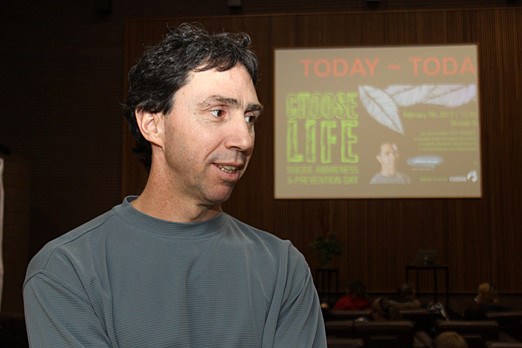THUNDER BAY -- Summer Lynne-Wawia wants to end the silence surrounding suicide and save her mother’s life.
The 26-year-old Confederation College student helped to organize an event at the school in order to promote suicide awareness. Lynne-Wawia, who is also a member of the board of directors for Oshki Anishnawbeg Student Association, spent more than two months organizing the event.
The main goal was to bring suicide prevention awareness to students and remove the stigma that prevents people from talking abou the issue.
“In my family you don’t talk about (suicide),” Lynne-Wawia said. “My grandfather committed suicide before I was born and a few younger children in my reserve have committed suicide. It has affected me and I didn’t know I could talk about.
“My mother mentioned that she wanted to die. I’ve been talking to her about it since I was a little girl. Today, I feel more confident in myself and my knowledge in provider her the support she needs. Hopefully I can save my mother’s life.”
Most First Nation communities have a suicide rate that is dramatically higher than the national average. Health Canada states suicide and self-inflicted injuries are the leading causes of death for First Nations youth and adults up to 44 years of age.
Aboriginal youth are also five to six times more likely to commit suicide than non-Aboriginals are.
Lynne-Wawia said communities don’t know how to handle the situation and culturally don’t talk about it.
“It’s hard to understand why someone would commit suicide,” she said. “It is safe to talk about suicide. People don’t get depressed or suicidal because you’re talking about it. Having someone to talk to and listen to is much better than having no one at all.”
She called the event a success because of the amount of people they reached through social media like Twitter and Facebook.
Scott Chisholm, a local firefighter and founder of Collateral Damage, was the keynote speaker of the event.
Chisholm’s 46-year-old father, Robert, took his own life about 30 years ago. He said society has to create tools for people to discuss suicide.
“Suicide is one of those things that have a huge stigma on it,” he said. “Not talking about it for many, many years has not helped us. When I lost my father over 30 years ago, my teachers didn’t want to talk about it; no one wanted to talk about it.”
Despite what people think, talking about suicide doesn’t mean the person with those thoughts will act on them. Chisholm said in most cases people want someone to listen more than for them to talk.
Suicide is a tough subject to talk about because it also encompasses other issues such as substance abuse and mental health, he said.
“It’s been taboo for a long, long time,” he said. “One of the big fears was that talking about it will cause it and the evidence shows that’s not the case.”
Chisholm added warning signs for suicide could include change in behaviour, sleeping patterns and losing interest in favourite activities.
